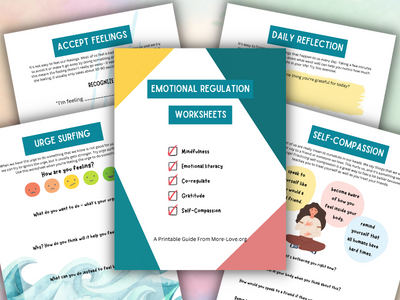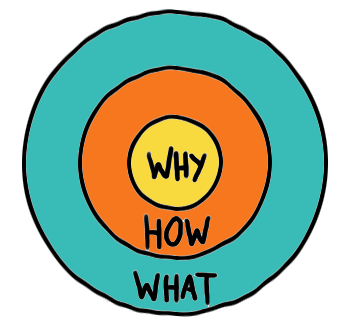
The Whole-Brain Child: 12 Revolutionary Strategies to Nurture Your Child’s Developing Mind, by Daniel J. Siegel M.D., and Tina Payne Bryson, Ph.D., is a book by a neuropsychiatrist and parenting expert offering advice for integrating a child’s brain to transform the natural struggles of raising a child into opportunities for growth and expansion.
Learning how the brain is wired can be helpful as we parent through everyday life as well as larger struggles such as eating disorders. The book is written largely for young children through 12 years old, and the authors promise a second book to address adolescents. But there is absolutely no reason you shouldn’t read this book if your child is older than 12. It applies to all human beings, not just children, and also offers skills for using the concepts in our parent brains, too.
Emotional Regulation Worksheets
Give these printable worksheets to grow more confident, calm and resilient and feel better, fast!
- Self-Esteem
- Self-Regulation
- Mindfulness
- Calming strategies
The concept is that in our noble moments, we all want our children to thrive. We want them to live fully-integrated, successful lives. However, most of parenting is not noble. Most of parenting is surviving through chaos and confusion. We all feel as if we are treading water, and if we wait for noble moments in order to pass along vital parenting information, we will never succeed.
This book offers specific tools and approaches for working with our kids during the difficult moments. The tantrums, the fights, the stubborn refusals, and provides brain science to harness the opportunities to be noble even during awful times.
By understanding how the brain works, you can “help your kids be more themselves, more at ease in the world, filled with more resilience and strength.” And is there any greater goal than that?
Here are some key tips from the book:
Connect with the emotional right brain before attempting to connect with the rational left brain
This is a very common problem in parenting. We tend to want to jump in with advice, solutions and rational thought with our kids. In striving for maximum efficiency and impact, we actually miss out on teaching our children because we have failed to connect with them emotionally first.
The fact is that unless your child is in a state of trust and comfort, nothing you say will be of much value.
When a battle is raging, connect with your teenager emotionally first. No matter how ridiculous the situation seems to you, don’t jump in with rational advice. This is a misguided attempt to soothe your child, and it does not work with the brain chemistry.
Only once he is feeling safe and secure should you offer advice, discipline or correction. Even better, especially with adolescents, don’t offer any advice unless your child specifically asks for it. Instead, debate and discuss the situation to enable him to find her own path with your guidance.
It is true that this takes more time. You may feel you don’t have time to spare. But when you take the time to connect with your child and build trust before offering advice, you save time in the long run. This is the “power of trust” explained in Stephen Covey’s book The SPEED of TRUST: The One Thing That Changes Everything.
Seek opportunities to intentionally connect the instinctual “downstairs brain” with the more thoughtful “upstairs brain”
The authors call the more primitive part of our brain the downstairs brain. You may also have heard this called the “lizard brain.” This is the part of our brain where we are programmed to fight, flight or freeze when faced with a difficult situation.
Emotional Regulation Worksheets
Give these printable worksheets to grow more confident, calm and resilient and feel better, fast!
- Self-Esteem
- Self-Regulation
- Mindfulness
- Calming strategies
While these instincts are honed for avoiding physical danger (which they very rarely face in today’s society), they react equally strongly to perceived emotional danger. This means that when your teenager perceives a threat to her identity, it is just as terrifying as if she were being chased by a lion.
Your teenager also has an “upstairs brain,” which is capable of strategic decision making, insight, empathy and morality. It is very likely that your teenager’s downstairs brain drives you absolutely crazy, while the upstairs brain gives you hope in parenting.
We ignore our children’s downstairs brains at our peril. The authors suggest using storytelling and intentional speech to acknowledge and integrate the downstairs brain and how it impacts the very real sense of fear and dread that often are constant companions for our teenagers.
Parents can help teenagers acknowledge and understand the downstairs brain while gradually engaging the upstairs brain when overcome with dangerous feelings that may be driving some eating disorder behaviors.
Parents can improve themselves and their parenting outcomes
The authors say that they have met with thousands of parents, and all of them say that what matters most to them is the ability to “survive difficult parenting moments, and they want their kids and their family to thrive.” Parents want their kids to be happy, independent and successful. They want them to live lives full of meaning and purpose. They want them to be able to sustain fulfilling relationships.
And yet, “think about what percentage of your time you spend intentionally developing these qualities in your children. If you’re like most parents, you worry that you spend too much time just trying to get through the day (and sometimes the next five minutes) and not enough time creating experiences that help your children thrive, both today and in the future.”
We have the opportunity as parents to intentionally support our children’s life outcomes, but too often we become overwhelmed by the day-to-day survival, and by the worrying about the future, to actually apply our intelligence to being better parents. By developing yourself as a human being, and learning what you can about your child’s brain, you can make a big impact on your child’s future.
This book is about using everyday moments with our kids to help them thrive. It teaches us about how our kids’ brains works so that we are better able to help them develop resilience, strength and health.

Ginny Jones is on a mission to empower parents to help their kids recover from eating disorders, body image issues, and other mental health conditions. She’s the founder of More-Love.org, an online resource supporting parents who have kids with eating disorders, and a Parent Coach who helps parents who have kids with mental health issues.
Ginny has been researching and writing about eating disorders since 2016. She incorporates the principles of neurobiology and attachment parenting with a non-diet, Health At Every Size® approach to health and recovery.
See Our Guide to Emotions And Eating Disorders

The Whole-Brain Child: 12 Revolutionary Strategies to Nurture Your Child’s Developing Mind, by Daniel J. Siegel M.D., and Tina Payne Bryson, Ph.D.
Do children conspire to make their parents’ lives endlessly challenging? No-it’s just their developing brain calling the shots! In this pioneering, practical book, Daniel J. Siegel, neuropsychiatrist and author of the bestselling book Mindsight, and parenting expert Tina Payne Bryson demystify the meltdowns and aggravation, explaining the new science of how a child’s brain is wired and how it matures.








